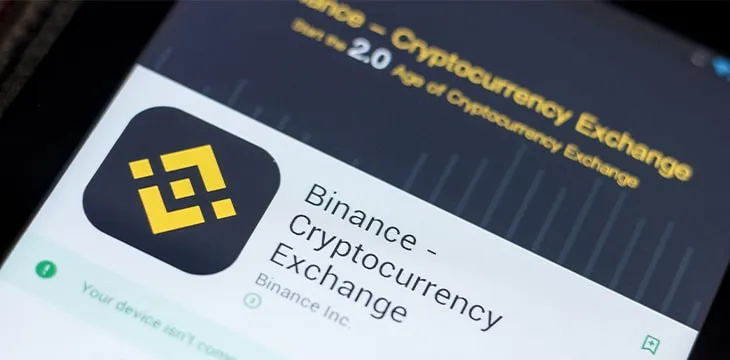|
Getting your Trinity Audio player ready...
|
Binance’s operations continue to contract as regulators across the globe tighten oversight of the beleaguered cryptocurrency exchange.
Last Thursday, Italy’s Consob securities regulator warned local investors that no Binance Group company was authorized to provide investment services and activities in the country. Consob urged investors to “exercise the utmost caution” in any transaction involving digital currencies and to recognize that they could get rug-pulled at any minute.
A day later, Lithuania’s central bank issued a warning that the Vilnius-based Binance UAB was offering “unlicensed investment services” in the country. The UAB offshoot, which is owned by Binance founder Changpeng ‘CZ’ Zhao, was listed as a payment ‘agent’ for the Binance Group and until recently was described as a Binance ‘operator’ in the exchange’s terms of service.
Those terms defined the ‘operator’ designation as ‘parties that run Binance,’ yet the company told the Financial Times that Binance UAB “does not operate or control Binance.com.” Sticking with its ‘who you gonna believe – me or your own eyes’ defense strategy, Binance declared that the Lithuanian warning didn’t “directly impact” services offered via Binance.com.
That same day, Hong Kong’s Securities and Futures Commission announced that the Binance Group lacked the authority to conduct any regulated activity in the special administrative region of China. The regulator warned investors that Binance had no local license under which it could offer its stock token products, while simultaneously warning Binance that it “will not hesitate to take enforcement action against unlicensed platform operators.”
Appearing a little more rattled by events tied to China, Binance rushed out a statement saying it had implemented an immediate halt to new stock token sales. Existing token holders will have 90 days in which to sell or close their positions, after which Binance will permanently close these positions.
Through a partnership with investment firm CM-Equity AG, Binance had offered customers the ability to buy tokens representing fractions of shares in tech companies such as Apple, Coinbase, Microsoft, MicroStrategy and Tesla.
Binance attempted to polish its Hong Kong turd by claiming it had independently chosen to “shift our commercial focus to other product offerings” but the legally sketchy stock tokens were previously called out by Germany’s securities regulator this spring. That opened the possibility that CZ might be required to shift his butt to a German prison if his oft-repeated public homages to compliance didn’t shift to something more tangible.
Unstablecoin
Binance’s stock tokens settled prices in the company’s Binance USD stablecoin, which is the third largest stablecoin by market cap (behind only Tether and Circle’s USDC). But heightened regulatory concern over stablecoins led CZ to attempt to distance his company from BUSD last Friday through a tweet that claimed the token “is actually not issued by Binance. We lend branding support only.”
https://twitter.com/iamZatoshi/status/1415950708281593861?s=20
CZ has issued some howlingly comical statements regarding Binance’s legally sketchy operations in recent months—including last week’s declaration that Binance was thoroughly enjoying its compliance ‘journey’ – but this one takes the biscuit. Without Binance listing and promoting trading of the stablecoin via its exchange, BUSD wouldn’t enjoy its privileged position, if it existed at all.
CZ appears to have watched the original Star Wars movie one too many times and is now convinced that he can escape regulatory blowback by employing Jedi mind tricks. We hate to break it to him, but telling regulators ‘these aren’t the tokens you’re looking for’ isn’t going to cut it.
Your cooperation is (un)appreciated
The past few weeks have seen regulatory shots across Binance’s bow in numerous jurisdictions, leading to the loss of major payment rails in the U.K. and the European Union. Regulators on multiple continents have warned Binance to GTFO or face the consequences, while several U.S. federal agencies are reportedly probing Binance executives’ potential involvement in suspected money laundering and tax evasion cases.
The ham-fisted nature of Binance’s compliance theater was amply demonstrated by a recent Bloomberg report that revealed the exchange had been soliciting letters of commendation from U.S. federal agencies for aiding the authorities’ efforts to stem the flow of ill-gotten gains through Binance.com.
The U.S. Department of Justice (DoJ) reportedly instructed other federal agencies to stop signing these letters, the wording of which was sent by Binance to the agencies in question. The DoJ reportedly reminded these agencies that compliance isn’t a favor Binance has the option of granting, at least, not if it wants to retain the illusion of compliance that the company loves to project.
Burn, baby, burn
Binance’s regulatory future appears so untenable that Sunday’s announcement of the second-largest quarterly burn of its in-house Binance Coin (BNB) token—the destruction of nearly 1.3 million BNB equal to nearly US$394 million—proved incapable of pumping BNB’s value.
Quite the opposite, as BNB’s value was down 7% by midday Monday, a greater percentage decline than the overall crypto market suffered on the day. The market appears to be treating Binance like it’s the subject of Lynyrd Skynyrd’s eerily prophetic That Smell, which warned that even as you insist that ‘you’ll be alright come tomorrow, tomorrow might not be here for you’.
As Binance circles the drain in such public fashion, CZ’s public obfuscations appear ever more desperate. This negative sentiment, along with the increasingly pejorative view of the Tether and USDC money-printers’ lack of clarity regarding their financial reserves, is weighing down the whole crypto sector. Then again, perhaps this is just a necessary purge of bad actors that will allow the digital currency sector to finally achieve the legitimacy that Binance appears so eager to avoid.
Follow CoinGeek’s Crypto Crime Cartel series, which delves into the stream of groups — from BitMEX to Binance, Bitcoin.com, Blockstream, ShapeShift, Coinbase, Ripple and
Ethereum—who have co-opted the digital asset revolution and turned the industry into a minefield for naïve (and even experienced) players in the market.

 05-06-2025
05-06-2025 





